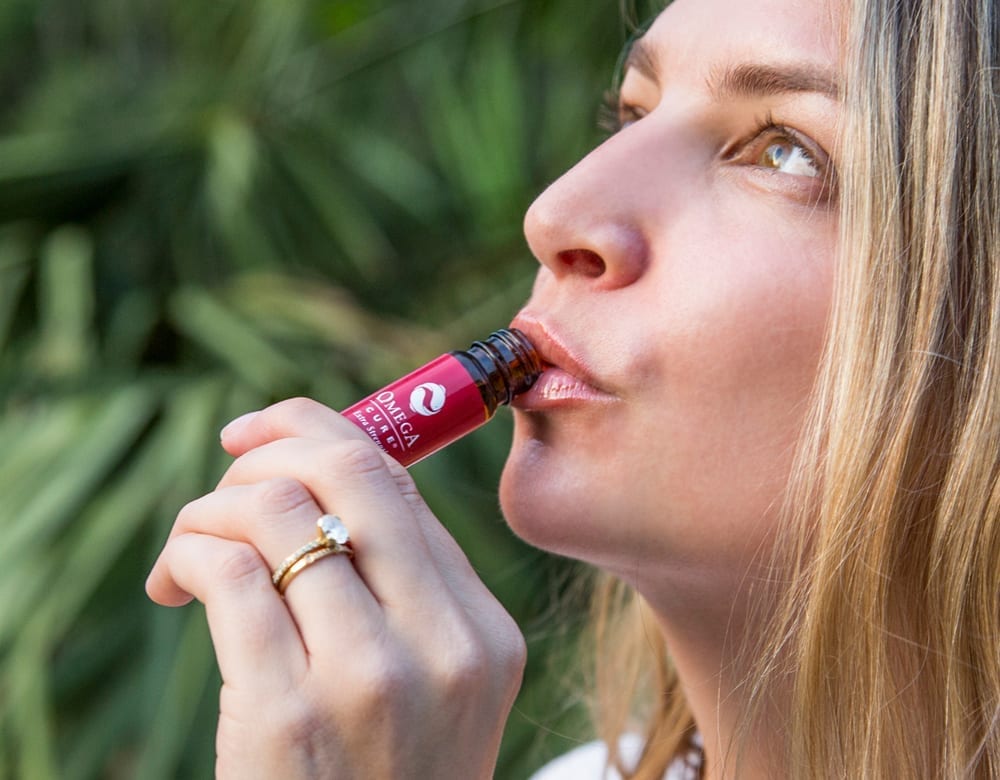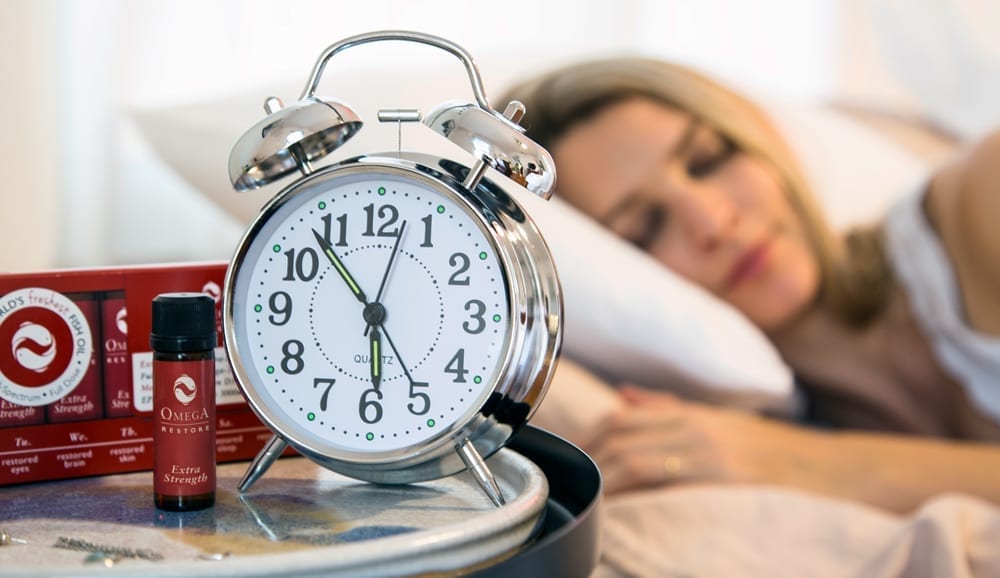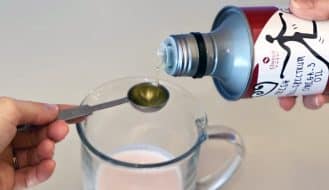What’s the Best Time to Take Your Fish Oil Supplement?
Breakfast has long been the preferred time for taking medications, supplements, and cod liver oil. At the start of each day, many of us like to take advantage of our renewed energy to focus on our health.
New research, however, has started linking medication efficacy to timing — and the findings make a compelling case for rescheduling our supplement routines.
So, when is the best time to take omega 3 fish oil supplements? Let’s take a closer look.
Why Many Medications & Supplements Work Better at Night
Several studies have now shown that aspirin and cholesterol-lowering drugs, as well as blood pressure and anti-reflux medications, may work better in the evening [1].
Over the course of a 24-hour period, our body follows an internal clock that manages many of its functions. Known as the circadian rhythm, this internal clock regulates our hormonal balance, blood pressure, and body temperature. It also affects the body’s ability to absorb chemicals in medications and nutrients in supplements.
Because many symptoms (especially related to acid reflux and heart disease) worsen over the course of the night, taking certain medications and supplements before bedtime may actually improve conditions the following day.
Let’s look at the example of taking anti-reflux medication. The stomach typically produces 2 – 3 times more acid from 10:00 pm – 2:00 am than at any other point of the day. In addition, heartburn typically worsens while lying down, which intensifies uncomfortable side effects.
These factors could explain why one study found that 70% of people who took their anti-reflux medication later in the day experienced greater relief, compared to the 42% who took their medication in the morning.
It has also been well-documented that heart attacks and strokes occur more often in the early morning. This phenomenon could explain why a 5-year study from Spain found that patients who took their blood pressure medicines at night had a 33% reduced risk of heart attack and strokes, compared to those who took their medications in the morning [1].
Absorption issues: Skipping meals, or eating low-fat breakfasts, could explain why some omega-3 supplement users don’t get the full benefits.
The Best Time to Take Omega 3 Fish Oil Supplements
Such trends may hold up for omega-3 fish oil supplements too. In the body, omega-3 concentrations decline overnight and reach their lowest point in the morning. This pattern suggests that the body may need the most omega-3s while we sleep – perhaps to support various brain functions, like creating new neurons.
The finding led one group of researchers to recommend taking omega-3 supplements in the evening, especially to improve cognitive function [2].
How a Low-Fat Meal Affects Absorption of Omega-3
There’s another factor to consider, too – namely what you eat.
For decades, many omega-3 users have been taking fish oil supplements first thing in the morning. However, researchers point out that omega-3 fatty acids need to be consumed with food — and preferably of the high-fat variety — to be absorbed well [3].
This is because docosahexaenoic acid (DHA) and eicosapentaenoic acid (EPA) need sufficient fat to release bile salts. The bile salts help the body digest and absorb the fats, allowing the body to reap the full health benefits of the omega-3s [4].
The trend towards low-fat breakfasts, and skipping breakfast entirely, could explain why some users don’t see sizable increases in their omega-3 index levels, even with fish oil supplementation [5].
What does that mean for consumers? Especially if you don’t eat breakfast, or typically eat low-fat foods in the morning, then aim to take your daily dose of omega-3 fatty acids later in the day with a meal.
Potential Benefits of Taking Fish Oil at Night
At Omega3 Innovations, we are dedicated to helping people transform their lives with fresh, full-spectrum omega-3s. All of our products are made with Omega Cure®, which delivers a fuller range of fatty acids than other omega-3 supplements. Omega Cure comes in single serve doses that ensure people get enough omega-3s for beneficial effects.
While getting an effective dose of high quality fish oil is vital for results, timing also matters. Besides the health issues mentioned above, here are two other reasons to consider taking your Omega Cure at night: Inflammation and sleep quality.
Arthritis and Joint Pain
If you have arthritis and joint pain, you likely experience more intense symptoms in the morning. One French study discovered that NSAIDs (non-steroidal anti-inflammatory drugs) were most effective when consumed four to eight hours before peak pain started [1].
Omega-3 fatty acids work on the same biochemical pathways as NSAIDs. So if you take fish oil supplements in the evening, it could make it easier to get out of bed in the morning with greater comfort.
Sleep Quality
In a pilot study from the UK, researchers found that children who took a fish oil supplement with omega-3s increased their sleep time by an average of 58 minutes. They also noted fewer wakeups during the night [6].
Other studies support the link between fatty fish consumption and sleep quality, indicating that adequate intake of omega-3 fatty acids is important for good quality rest, improved relaxation and a lowered risk of sleep apnea [7, 8, 9].
For adults looking to support their sleep quality, there’s Omega Restore. Omega Restore provides the same benefits as Omega Cure, but with added melatonin. Not only do omega-3 and melatonin work together to fight free radicals and oxidative stress, but they can also help to provide a more satisfying sleep pattern.
Omega-3s You Take at Night: Omega Restore combines omega-3s with melatonin in one dose for potent results.
Consistency Is Key for Health Benefits
Over the last few years, we’ve suggested that our customers take their Omega Cure and Omega Restore vials in the evening before going to bed. To date, the feedback has been overwhelmingly positive. Not only have customers reported better sleep quality and more energy during the day, but many have also noticed positive impacts on eyes and joints, too.
That being said, just like any supplement or medication, it won’t make much of a difference if you don’t take it consistently. So for best results, find a time of day that works for you – and stick with it.
Tips for Incorporating Omega-3
Here are some practical tips to help you incorporate fish oil supplements into your daily routine:
• Pair with Meals: Take your omega-3 supplement with a meal that includes healthy fats to enhance absorption.
• Choose High-Quality Supplements: Look for fresh, full spectrum liquid omega 3 supplements, like Omega Cure. Liquid fish oils are easier for the body to absorb than fish oil pills. In addition, they can be added into foods, like yogurt or kefir.
• Set Reminders: Use alarms or smartphone apps to remind you to take your supplements each day.
• Take the Right Dosage: Make sure you know how much fish oil you should take each day to ensure you’re getting the full health benefits from your dietary supplements.
An Effective Omega-3 Dose, Made Simple
Experience the Omega3 Innovations difference for yourself with the most effective fish oil supplement on the market.
Buy Now
References:
1. Bateson, Lynne. When Is It the Best Time to Take Your Medication? The Daily Express. January 28, 2015.
2. Jackson, Philippa A et al. Diurnal Rhythm of Plasma EPA and DHA in Healthy Adults. Prostaglandins, Leukotrienes, and Essential Fatty Acids. January 2020; vol. 154, 102054.
3.Von Schacky, C. Omega-3 Fatty Acids in Cardiovascular Disease–An Uphill Battle. Prostaglandins, Leukotrienes & Essential Fatty Acids. January 2015; 92:41-7.
4. Qin, Y. et al. A Novel Self-Micro-Emulsifying Delivery System (SMEDS) Formulation Significantly Improves the Fasting Absorption of EPA and DHA from a Single Dose of an Omega-3 Ethyl Ester Concentrate. Lipids in Health & Disease. October 2017; 16, 204.
5. BASF Explores Why Omega-3s Are Not Yet Optimal. Nutra-Ingredients.com. May 15, 2018.
6. Montgomery, P et al. Fatty Acids and Sleep in UK Children: Subjective and Pilot Objective Sleep Results from the DOLAB Study–A Randomized Controlled Trial. Journal of Sleep Research. August 2014; 23 (4): 364-88.
7. Yehuda, S et al. Mixture of Essential Fatty Acids Lowers Test Anxiety. Nutritional Neuroscience. August 2005; 8 (4): 265-7.
8. Scorza, FA et al. Sleep Apnea and Inflammation – Getting a Good Night’s Sleep with Omega-3 Supplementation. Frontiers in Neurology. December 2013; 4: 193.
9. Ladesich, JB et al. Membrane Level of Omega-3 Docosahexaenoic Acid Is Associated with Severity of Obstructive Sleep Apnea. Journal of Clinical Sleep Medicine. August 15, 2011; 7 (4): 391-6.
Recent Posts
-
Omega-3
7 Signs You Have an Omega-3 Deficiency
Despite living in an age of nutritional abundance, roughly 95% of Americans suffer from a silent epidemic: omega-3 deficiency. This trend has far-reaching implications for public health but remains under...1 week ago -
Dose, Omega-3
How Much Omega 3 Per Day Should I Take?
If you pop a daily fish oil capsule – or drink a teaspoon of cod liver oil most mornings – it can be tempting to think you're all set in...1 week ago -
Dose, Freshness, Omega-3
5 Mistakes People Make When Taking Liquid Fish Oil
If you are already taking fish oil as liquid and not as pills, give yourself a big pat on the back! You've clearly done your research, and pay attention to...1 week ago -
Heart Health, Sleep
What’s the Best Time to Take Your Fish Oil Supplement?
Breakfast has long been the preferred time for taking medications, supplements, and cod liver oil. At the start of each day, many of us like to take advantage of our...1 week ago -
Dose, Omega-3
Liquid Omega-3 Fish Oil Vs. Capsules: Which Is More Effective?
When we first launched Omega Cure® liquid cod liver oil in 2006, customers started reporting greater benefits than we anticipated based on research studies. Why did this oil seem to...1 week ago -
Omega-3
Fish Oil vs Omega 3: What’s the Difference?
Fish oil and omega-3. The two words often get tossed around interchangeably. But as you may have guessed, fish oil and omega 3 are not actually the same thing. They...3 weeks ago









